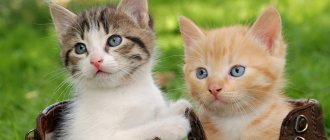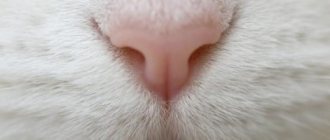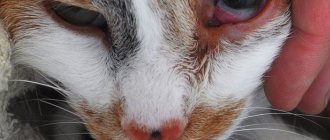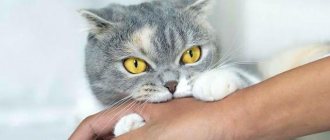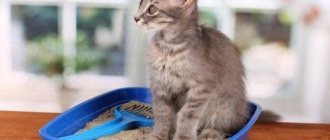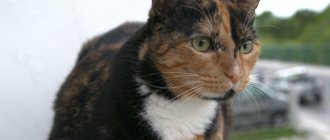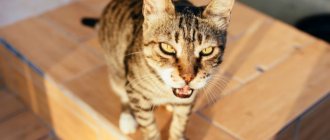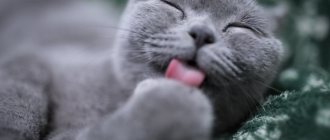5182Pavel
We are amazed at how similar the habits of humans and animals are. And when a cat sucks its paw, it shocks the owners and they start turning to the Internet for advice or going to veterinarians.
Cat owners often wonder why a cat sucks its paw? Many even make videos to surprise their friends, because not every cat constantly starts sucking its paw before going to bed. If you look quietly into the house, you can see how selflessly the kitten licks its fingertips, many of them turn on their internal motor, to the sound of which they themselves fall asleep.
© shutterstock
About breastfeeding kittens
In the first days, colostrum is formed. It promotes the active colonization of kittens’ gastrointestinal tract by microflora. After this, the production of transitional milk begins, and then mature milk. The duration of feeding is regulated naturally. Some cats nurse their kittens for up to 15 weeks. But most individuals stop feeding at 8-12 weeks.
Until the 12th week, it is advisable not to interfere with the process in any way.
Nature has laid down all the necessary instincts for a young mother cat to successfully overcome previously unfamiliar difficulties and safely raise her offspring. There have been cases when a cat, during the feeding process, willingly accepted other people's kittens from another litter and subsequently treated them as if they were her own.
However, not all pets are capable of this. Just like humans, cats can have difficulty producing milk or not getting enough milk. In such cases, owners begin to look for information on how to quickly correct the situation and provide the kittens with normal nutrition.
How can I stop my cat from constantly licking?
To stop your cat from constantly licking:
- Stop them from continuing this behavior.
- Start by removing any intangible items from your home that they frequently lick.
- If you cannot remove the items, spray them with a special pet spray, which should have a bitter taste and discourage your cat from continuing to lick.
To occupy their licking time, try providing safer alternatives such as non-toxic pet toys and spend time cuddling with them instead. If you distract your cat during times when she is most likely to want to lick, you can encourage her to stop this bad behavior.
Physiological processes of kitten development
As a rule, the lactation period ends on its own when kittens reach the age of 9-12 weeks. By this time, growing cats have already managed to fully master all the necessary skills for independent feeding with solid and liquid types of food.
Pets of long-haired breeds develop somewhat more slowly than outbred kittens, so they need the longest possible period of milk feeding. This means that feeding without the participation of a cat will require additional time for purebred kittens.
On average, the best period for weaning from a cat is 2-2.5 months of age.
At this point, the little pet is completely ready to transition to solid food and whole milk.
When can you remove kittens from your cat?
As a rule, the lactation period in cats ends when the kittens are 9-12 weeks old. During this period, babies can already eat on their own; it is permissible to gradually introduce new foods into their diet. Long-haired kittens and representatives of exotic rare breeds are taken away from their mother cat at an older age, since they develop more slowly than representatives of simple breeds.
Read also: All food is over-salted
Important! 2-2.5 months is the best time not only for weaning kittens from the mother cat, but also for accustoming small pets to solid food, new products after whole milk feeding.
If a cat has given birth to many kittens, the pet is in poor health, the caring mother gradually stops the lactation process when the kittens are 30-35 days old. Cats independently stop their kittens' attempts to suckle milk. They lay their nipples on the floor, carefully move the kittens to the side, or simply go to another place, leaving the babies for a while.
Read also: Baby has crooked legs
If babies are healthy, at about three weeks of age they begin to show interest in new foods and may even lap up milk from their mother's bowl. Already at this age, especially if there are many kittens in the litter, they can be supplemented with a mother's milk substitute, giving the babies 0.5-1 teaspoon. After a week, you can supplement the diet with baby food and special formulas for newborn babies.
Important! Boiled chicken, ready-made food, and other food products are introduced into the diet gradually, in small portions, so as not to provoke an upset stomach.
Young kittens up to two months old should be fed four times a day, regardless of how much mother's milk they receive. At six weeks of age, babies should receive three to four teaspoons of complementary foods per feeding. By 7-10 weeks of age, the serving size is gradually increased. At the same time, meat products should predominate in the diet.
Kittens can be given special canned liquid food, canned food (marked “for kittens”), boiled poultry, veal (in the form of minced meat). After two and a half months, gradually accustom small pets to more solid food and feed.
Methods for weaning kittens from sucking
There are several ways to make kittens lose interest in mother's milk faster:
- Games . At the age of 3-4 weeks, pets love to play. They can be distracted from their mother by the rustling or squeaking of toys. Feeding can be introduced according to a specific schedule. The kittens should spend the rest of the time without their mother.
- Time . Most young pets stop sucking without intervention. This happens when the kitten begins to feel like a separate person. By the way, the habit of trampling in cats comes from deep childhood, when kittens massage their mother’s belly so that more milk is produced. On a subconscious level, trampling and the pleasure of sucking are linked into a single whole.
- Pacifier. For very small kittens, there are special bottles with a small nipple. They are very convenient and quick to feed your pets without any difficulties. Over time, the kitten itself will switch to the feeding method familiar to its owners.
Reasons and other ways to wean a mother cat from sucking. Kittens can suck on anything. As a rule, this happens due to stress and lack of communication with the mother. One way to solve the problem is to purchase a wool glove made from natural fibers without dyes and provide it for the kitten’s full use. The pet must have its own equipped place. When the glove is not in use, you need to transfer it to the kitten's house.
Why is it dangerous?
If the pet then starts eating the owner's things, the risk of intestinal obstruction increases. First of all, it is necessary to find out the reason for this behavior of the pet in order to exclude serious diseases. If the animal is healthy, then the worst thing is when the cat goes from sucking things to chewing and swallowing them. Which can lead to blockage of the esophagus and intestinal obstruction, and such conditions often result in death. If the fabric is synthetic or contains toxic dyes, the animal will develop severe intoxication.
When and how to wean correctly
If babies continue to suck on the cat’s nipples even after the end of lactation, they need to be weaned off this bad habit gradually.
Even if a caring cat does not drive away the cubs, the sucking reflex turns into a bad habit, which will be very difficult to get rid of in the future.
An older cat will happily suck on your clothes, things, hands, and hair. Therefore, it is necessary to develop the chewing reflex and other useful skills in animals in a timely manner, but gradually.
Kittens can be separated from a cat after two months.
At this age, babies can feed themselves, eat solid foods and adapt to new conditions faster.
You can dull the sucking reflex quite simply:
- Isolate the kittens from the cat for several hours every day by locking them in another room.
- Provide your pets with bowls of milk and food.
- Soak your finger in the milk, let the kitten lick it, then lightly poke his nose into the bowl. Don't poke your kitten's face too deeply into the bowl. The kitten will get scared and may choke.
- Repeat the procedure several times in a row.
If kittens refuse to go to the bowls, give them milk from a baby bottle. Well-fed pets will nurse less from their mother cat. The mixtures must be fresh, warmed to room temperature.
To help kittens adapt faster and not experience severe stress, give them toys and talk to your pets in a gentle, gentle tone. Gradually increase the isolation time, teaching you independence. Over time, small pets will get used to the fact that there are other, equally tasty food sources.
If an older kitten continues to suck on the cat’s nipples, although the female does not have milk, wrap the nipples with gauze and put on a blanket made of soft, sterile fabric. But never treat your nipples with ointments, camphor alcohol, or oil. This can cause poisoning and severe intoxication in kittens.
The nipples of lactating cats are treated with products for external use only in case of pathologies of the mammary glands, false pregnancy, excessive secretion of milk, for example, with early weaning of kittens or the birth of non-viable offspring.
Why does a cat suck its paw?
Experienced cat owners, volunteers and veterinarians with professional skills in caring for kittens believe, not without reason, that the habit of paw sucking mainly remains in individuals who were left too early without maternal care:
- By doing this, the little ones compensate for the love of the mother cat, remembering how cozy it was next to her warm, furry tummy.
- Orphan kittens, when sucking their paw, feel safer, this calms them down.
- For an older cat, the habit does not go away; he also experiences a lack of parental attention and tries to make up for it with his manipulations.
- An analogy can be drawn with human children. If a kitten sucks its paw, then for the same purpose the child can twirl a strand of hair around his finger - first his mother’s, and later his own. Some people, even as adults, fidget with their earlobe if something bothers them.
- The paw is not the only thing a pet can “encroach” on. Many “under-caressed” cats, whenever possible, stick to the hand or other part of the owner’s body. It is very important for them to be close and feel a kindred spirit nearby.
- The animal may pick at a corner of a pillow, blanket, robe, or removed clothing, including worn socks. Perhaps the pet is attracted to the owner’s familiar aroma and taste. This is often accompanied by the release of claws.
Creating conditions as close to natural as possible
A cat's fur is a kind of pillow and a way to preserve and accumulate heat. Kittens in such conditions are protected from low temperatures and feel completely safe. If a cat is weaned from sucking, you need to set up a small area for the pets to grow up comfortably:
- immediately after birth, it is best to use products made from natural wool;
- as the eyes open after 5-10 days, they can be replaced with more rigid materials, for example, a loose layer of a piece of padding polyester.
If you have the desire and funds, there are many ready-made solutions available for sale. A variety of nesting houses in pet stores allow you to choose the best option, taking into account the number of kittens, room temperature and general interior. As pets get older, they will begin to see the house as their personal space and will gather together for naps.
Facts about the sucking reflex
Sucking is an indicator of the newborn's vitality and health, a method of nutrition, as well as the first experience of communication and knowledge of the world. According to zoologists:
- An active kitten, barely born, instinctively crawls to the warm mother's belly, independently finds the nipple and greedily sucks in the precious colostrum. Small and weakened babies suck poorly or are not able to suck at all, which indicates their low vitality and possible developmental defects.
- Sucking is not only the process of absorbing food, but also the establishment of a strong emotional connection with the mother, and the creation of the first psychological associations. While sucking, the kitten is in a state of peace and comfort and, having had enough, calmly falls asleep.
- The warmth of the native nest, licking by the mother's wet tongue, the smell of milk and its taste are included in the complex of first sensations of a baby kitten that has just begun its life's journey. The mother cat and littermates are the first creatures with which the baby interacts and communicates.
- Sucking contributes to the development of the kitten’s vestibular apparatus and coordination of movements: just observe what exotic positions the babies take in order to get to the life-giving source on the mother’s stomach. Subsequently, sucking skills are transformed into the ability to capture and hold prey in the mouth, as well as cut it up.
- Having opened its eyes and learned to walk, the kitten begins to more actively explore the world around it and does this with the help of its mouth and limbs. Having gently touched the paw pad and made sure that the object is safe, the baby will most likely want to taste it, trying to suck and chew at the same time.
Recommendations for the owner
During the process of artificial feeding, the kitten will begin to treat the owner’s hands and their smell as their mother’s. Therefore, in the future he will need a lot of close communication.
If possible, you should spend as much time as possible together to create a positive emotional background for your pets and a painless transition to adulthood.
Of course, for both children and kittens, the ideal option after birth is mother's milk. But some difficulties can make this process impossible, and then the owner has to look for a way out of the situation. The modern pet supply industry has already created everything necessary to make the task of successfully raising newborn kittens without mother's milk as easy as possible.
What not to do during the weaning process
There are things you shouldn't do to avoid harming your cat:
- It is often advised to splash water on your pet in the process of weaning off the sucking reflex. This cannot be done, because in this case you create an association in the animal with unpleasant sensations, but also provoke the appearance of fears. The cat may get scared and become very stressed. In addition, against the background of what is happening, real psychological trauma may appear that will accompany the animal throughout its life. It is even possible to have a phobia of water.
- You cannot scold the cat or make physical comments. There is a possibility that the animal will misunderstand you and will simply be afraid. And against the backdrop of stress, the desire to suck on things or objects will only increase.
- If the kitten is weaned from its mother's breast, you should not smear pepper or anything else on the nipples. This can have a detrimental effect on the female. It is better to consider other options for weaning. For example, gradually separate animals in different rooms for a while. Moreover, it is better to play with the little fidget at this time. You shouldn't leave it alone. Nothing good will come of this.
Sometimes cats' sucking reflex does not disappear as they grow older. There could be many reasons for this.
To wean your pet from the desire to suck and chew objects and things, it is recommended to follow some rules. For the most part, they relate to gradual work with the animal, a complete absence of aggression and curses.
In this case, it is extremely important to avoid stress, otherwise the efforts will not be successful
What causes the sucking reflex in kittens?
The mother’s ability to suckle is an unconditioned reflex that ensures the vital functions of the body. A newborn kitten, who can only squeak and suck, chooses its mother's nipple. She grabs it into her mouth, strokes it with her tongue, moves her paws over the mother’s belly, stimulating lactation, and defends the right to food, pushing away her sisters and brothers.
Although the eyes and ears are closed, the sense of smell and touch works:
- the nipple is located by smell;
- body position is adjusted using thermoregulation and tactile receptors.
Important. The first teeth appear from the 12th day; feeding with raw meat is allowed from 3-4 weeks of age. It is cut into thin strips, “worms”, which the kitten swallows with a sucking movement - it cannot chew yet.
A cat in the village or a wild one brings mice, independently accustoming the cubs to solid food. The transition to a normal diet for the species lasts up to 6 months.
People acquire month-old sucklers, sometimes a little older than a month. The transition to food that is convenient for the owner is abrupt; in this case, the sucking reflex does not subside, but this is the most favorable time to wean the kitten from sucking.
Is it normal for cats to lick everything?
No, the cat does not lick everything in sight. Cats are indeed great lickers for personal hygiene and grooming other cats, but there is cause for concern if they are licking inanimate objects around the house.
If you notice your cat licking everything, know that the condition is usually treatable and your cat can overcome compulsive licking with some work. Changes should be made to your cat's diet and home environment to reduce compulsive licking behavior.
Anatomy of a flea.
The jump height of a flea reaches one third of a meter with a “growth” of two to eight millimeters. The flea's body consists of three parts: head, thorax and peritoneum. Six legs are attached to the chest in three pairs. The last pair is much longer than the others; it is this pair that allows the flea to make jumps many times greater than its own size. Fleas don't have wings. Most flea species are brown to red in color and have a laterally flattened body. Fleas have eyes and antennae that detect shadows, heat, vibration, carbon dioxide and changes in air currents that indicate the presence of potential food nearby.
Why does a cat lick obsessively?
Cats who obsessively lick may be suffering from either boredom or a compulsive disorder. Often, compulsive licking of cats is a sign of persistent mental imbalance. Cats may also suffer from anxiety or other mental health problems.
If your cat seems to be a compulsive licker, spend time trying to redirect her attention away from licking herself and toward other playful activities.
Compulsive licking is more common in cats that live primarily indoors, as their surroundings are often less stimulating than cats that have free rein to explore their environment.
Another incident that can cause your cat to start licking is a big change in your home environment. If you recently brought home a new baby or a new pet, this may cause your cat to have a compulsive fit.
Why does a cat suck a blanket, blanket, tail or paw?
Owners don’t think about how to wean a cat from sucking a blanket if every morning the pet has a happy face:
- jumps on the bed;
- paws;
- purrs with pleasure.
This behavior is a sign of trust and love between the pet and its owner. Sucking on a blanket saturated with the scent of a person of the highest rank in the family is a recognition of strength and, at the same time, one’s own safety.
Weaning a kitten from a pathological sucking reflex
Sometimes older kittens continue to suckle the cat after the end of the lactation period. If left unchecked, it becomes a habit that is difficult to break. Cat owners should be aware of the existence of methods for blocking formed addictions and ways to develop correct behavioral stereotypes.
The kitten needs the sucking reflex in the first weeks of life. Over time, it weakens, and pets acquire the ability to feed on their own. In some cases, atypical behavior of babies is observed: they continue to cling to the mother’s empty nipples, suck the owner’s fingers, and try to gnaw hard objects.
To combat a bad habit, it is important for the owner to maintain personal calm, act gradually and purposefully, excluding rude methods and psychological negativity.
Ways to wean a kitten from sucking mother's milk:
- Separate the cat from the kittens every day for several hours, gradually increasing the time of separate existence.
- Gradual weaning of a kitten to suck. The cat is accustomed to a bottle with the mixture; it becomes weaned from the smell of the cat. The milk mixture should be fresh and at room temperature. It is better to use goat's milk; cow's milk is poorly absorbed by the cat's body. The second stage - they offer to lap milk from a saucer. The baby is learning a new way of getting food.
- They are taught to lap by soaking their finger in milk. They let the kitten lick it, then lightly poke it with its nose into the saucer. They make sure that the cat doesn’t get scared or choke. The procedure is repeated several times.
- Feeding is carried out according to a schedule, the rest of the time the pet is given maximum attention: they teach him active games, buy interesting toys.
- They reduce the kitten’s attention to the mother’s nipples by wrapping the cat’s belly with gauze and putting a soft, clean blanket on the animal.
Normally, the sucking reflex becomes dull by 5-6 months. Some young cats do not give up the bad habit and continue to suck woolen items, fingers and other parts of the owner’s body. The reasons may be: early separation from the mother, lack of attention, nervous disorders.
Siamese, Persian, and Thai cats are genetically prone to the syndrome. The reasons for sucking inedible things lie in dental problems and endocrine disorders. The habit of sucking is an indicator of abnormal mental development of the animal, which must be gotten rid of. Ingestion of villi promotes the formation of bezoars (hairballs), which cause intestinal obstruction.
How to stop a kitten from sucking inedible objects:
- Things with the owner’s scent are removed, clothes are sprayed with essential oils with the aromas of citrus, menthol, and pine.
- Hard surfaces are treated with lemon juice, vinegar solution, and repellent sprays from the pet store.
- Give the kitten enough water. Milk does not replace water.
- With clean hands, massage the animal’s gums, which itch during teething.
- Soothing drops, herbal teas from a veterinary pharmacy, and products with pheromones help wean one from a bad habit.
- Buy a cat house. It serves as a refuge where your pet can hide during times of stress.
When a young cat stubbornly continues to suck the blanket, its tail, the owner’s fingers - they act in stages.
List of actions to wean a kitten from sucking:
- allow one finger to be sucked;
- put a woolen glove on the finger;
- teach the kitten to suck a glove without a finger;
- equip a personal shelter where the glove will be kept accessible and inviolable.
- gradually reduce the time the cat spends time with the glove, distracting him with games.
A gentle approach and maximum patience help the kitten overcome “childhood fears” and get rid of a bad habit without stressing the psyche.
Instructions
Not all kittens stop sucking when they grow up. There are times when people take an adult cat, and it begins to suck on their clothes, nose, hands, etc. This is touching, but you need to find ways to wean your cat from sucking. There is a risk that she may become too dependent on her owner, timid and unable to communicate with other cats. This doesn't always happen, but there is a possibility. Here are several options for how to do this: It happens that a cat sucks on one part of the body or an item of clothing. If it's clothing, hide it. Or coat the selected area with mustard, citrus juice or garlic. After a few times, the cat will lose the desire to suck on this place.
Gimpet Katzen Grass Fast-germinating grass for cats, 100 g
Price: 131 rub. 177 rub. 26% discount for you! Cleanses the gastrointestinal tract and prevents constipation. Fast delivery throughout Russia. And also more than 3,000 other pet products at competitive prices! Take a look!
Start playing with her. As in the case of kittens, an adult cat can be weaned from sucking by distracting it with something. Take out her favorite toy, shake it in front of the cat, and throw it on the floor. Most likely, she will run after her and will no longer show interest in sucking. If it doesn't bother you too much, you don't have to do anything. Sucking may be an indication that the kitten has been weaned early and wants to compensate. He seeks warmth and affection from his owners, do not deny him this.
You need to gradually wean your kitten or cat off suckling. Do not use cruel methods under any circumstances: splashing water, loud screams, physical punishment. This can affect the cat’s health and traumatize its psyche.
The sucking reflex in representatives of the cat family is formed in the neonatal period, in the first three to five days after birth. Newborn kittens with colostrum and milk receive basic nutrition and protective antibodies.
Normally, after three to six days they find the nipples on their own, relying on the warmth and smells coming from the mother. Cats stop feeding their cubs when they are two to two and a half months old. But sometimes, after the end of the lactation period, the kitten continues to suck on the nipples out of habit. You can also notice that cats love to suck on things and do this with enviable regularity. Therefore, if you are interested in how to wean a kitten from the sucking reflex, read the tips given in this article.
How to stop a cat from licking
If your cat is an avid licker, you can stop her by addressing any health or stress issues that are causing her to lick.
As we've already learned, cats need to lick themselves for many healthy reasons, but there are also many unhealthy habits that can arise from it.
The main thing to look for is whether your cat licks for a very long time or if she licks very frequently throughout the day. If you can positively determine that she is licking an area of her body that is causing her pain, you should resolve the compulsive licking by treating the injury.
Outside of medical reasons, to reduce the amount of licking your cat does, you will have to reduce the amount of stress in her life.
Please take steps to create a safe area for them in your home, free from loud noises and stressors. Make sure your cat gets enough exercise throughout the day. After a few weeks of this regimen, check to see if your cat is licking less frequently.
How to stop a cat from sucking
A cat's rough tongue looks like a fine-toothed comb through a magnifying glass. While licking, wool hairs cling to it. To clean the tongue, you have to swallow the fur.
Bezoars (balls of fur or hair) form in the stomach, and the risk of ileus (intestinal blockage) increases. This is a common problem in young and old cats and long-haired breeds.
Therefore, the kitten must be weaned in advance from the sucking reflex, since a healthy adult animal does not have the habit of sucking inedible things.
Expert advice: to maintain normal intestinal function, veterinarians recommend adding plant fiber and vitamins to the diet.
A tiny one-month-old kitten, weaned from its mother, is fed from a nipple. At the same time, give frozen meat or fish cut into strips. Gradually transfer to kitten food enriched with vitamins: feeding from the nipple 4-5 times a day is replaced by the usual one.
When your baby's teeth are growing and there is nothing suitable to chew on, a woolen blanket will do. At this moment, you need to carefully unhook the kitten and massage its gums with clean fingers. And in the near future, give him a toy (not made of fabric: he will chew it and swallow it!).
If an adult cat sucks on a blanket, a thyroid function test is necessary. The veterinarian will prescribe hormonal therapy (injections of the hormone thyroxine). Restoring hormonal balance helps eliminate bad habits.
Things that can be removed are removed, and the rest are sprayed with a citrus-scented spray. The cat, regardless of age, is given soothing tea (brewed like tea: a pinch of oregano, St. John's wort, lemon balm, motherwort) or ready-made herbal tea from a veterinary pharmacy.
The more often a cat is picked up, stroked, played, the faster new sensations will turn off the sucking reflex. In a calm environment, a cat would prefer to chew on a fortified bone rather than ruin the owner’s sweater.
Is your kitten sucking on the blanket? Why do they do this and should you worry?
Have you ever watched your pet “suck” on a terry blanket, robe or blanket? Probably the first thing that comes to mind is the baby’s lack of a mother cat. What other reasons are there for this kitten’s strange habit? Should we wean him off this? Or maybe it will outgrow itself? Let's try to answer these questions in this article :)
Causes of bad habit
Why does your pet show such love for rugs and blankets:
- The kitten was taken from its mother early;
- Stress (in this case we can say that by “sucking” the blanket the animal calms itself down, using it as an anti-stress);
- Insufficient attention from the owner (thus the cat attracts your attention);
- Inactivity (some cats lack physical activity, the animal becomes bored and seeks attention and care);
- Diseases (the list of diseases is extremely extensive, it can be either a lack of vitamins or a brain tumor.).
There is a more harmless explanation for this strange behavior of the cat. Cats have glands on their paws that secrete a certain odor. If your cat kneads the blanket with its paws, while “sucking” it and purring, most likely he is just happy and thus marking the territory in which he is comfortable to be :)
Possible health hazards
Perhaps your pet will wrinkle and “suck” the blanket throughout its life. This is considered natural cat behavior. They just find it fun.
In this case, the main thing is to ensure that your pet does not start swallowing inedible objects during such a pastime. It is also worth paying attention to the composition of the “sucked” item. It may contain toxic dyes.
Also, individual fibers can cling to the cat’s rough tongue. In order to clean the tongue the animal has to swallow them. When villi accumulate in the stomach, they form lumps, which can lead to intestinal blockage.
How to wean
If a cat is sucking on a specific object, the first thing you need to do is eliminate it. Thus, the simplest rule comes into play: “ no source = no problem”
". If it’s too hard for you to part with your favorite blanket, you can try to drive the cat away with a spray bottle of water or spray it with something that smells like citrus.
If you catch your pet doing this “indecent” activity, distract him. You can play with the animal, but you need to do this for 10-20 minutes so that the cat’s brain has time to restructure (and forget about the previous activity). After playing, you can pet the animal, in which case your baby will enjoy the entertainment rather than the “sucking”.
What are the symptoms of a flea infestation and how is an infestation diagnosed?
A flea goes through four developmental phases: egg, larva, pupa, and adult. Two days after mating, females begin to lay eggs. The eggs do not stick to the fur, so they usually fall off the animal. Along with eggs, fleas produce large amounts of feces. When wetted, these impurities turn the water red, as they consist mainly of processed blood.
After two days (or more, depending on the air temperature), the egg develops into a larva, which looks like a small worm. The larva feeds on the mother's waste products. In about a week, the larva goes through several stages of development and begins to form a cocoon, turning into a pupa. Cocona is sticky, so it becomes covered with a layer of dirt and dust, and can get stuck in cracks, carpet pile, etc.
Flea bites manifest themselves in varying degrees. Some cats hardly notice them, while others experience mild irritation. In a significant number of cats, flea bites lead to severe itching, inflammation and redness of the skin, hair loss, and even ulcers. A severe disease caused by hypersensitivity to flea saliva is called flea allergy dermatitis.
A large number of fleas can cause anemia in a cat (and especially kittens), which can even be life-threatening.
Fleas in a cat are diagnosed visually - you can find the fleas themselves, their eggs and waste products. You can comb fleas out of your fur using a fine-toothed comb. If there are no fleas, but some dirt has been combed out, moisten it with water on a white sheet. If the dirt turns the leaf red, it means you are dealing with fleas.
Why do older cats lick everything?
Your older cat may lick everything in sight because she has developed a pika. This condition is defined as a cat that constantly licks or tries to eat something inedible in your home. This can range from licking the floors to the furniture in your home.
Although more research is needed to find out what causes pica, it can often be found in older cats with several other medical conditions, from anemia to diabetes. It is also often associated with a potential dietary problem, such as a deficiency of an essential vitamin.
Older cats may also begin to lose their vision, and your old cat may lick things in your home because they are confused and mistook inanimate objects for something else.
© shutterstock
Why do kittens stick to objects?
If your cat is sucking on your hand, ear, or other things, the following may be the cause:
- Early weaning from breastfeeding mother's milk or mother cat.
- Lack of love and care from the owner. Kittens feel a particular shortage during adaptation and socialization. At this time, the owner will need to create the most comfortable conditions for the growth and development of the pet, and protect it from stress.
- Boredom. If a kitten is bored, it may begin to exhibit a sucking reflex.
- Hereditary or breed predisposition. When the kitten's parents had the same habits, with a high degree of probability they can be passed on to the small cat. In addition, representatives of the Persian and Siamese breeds are most susceptible to the sucking reflex.
- Constant stress.
- Diseases of the endocrine system and dental problems. In this situation, the presence of pathologies can only be determined by a veterinarian. If the owner of a kitten suspects the development of illnesses, you need to take the kitty to a veterinary clinic.
Often this habit is formed in children who are artificial.
Being on artificial feeding and underfeeding also causes the sucking reflex to appear. In this case, cats often try to get food for themselves on their own. Often the pet cuddles in woolen clothes, which remind him of his mother. It is important for the owner to force the cat to get rid of this habit as soon as possible, since hairballs get stuck in the stomach and cause problems with the digestive system. In addition, similar behavior can be observed when there is a lack of vitamins in the body.
Reasons for the habit
A deviation in pet behavior in which a cat sucks or licks clothes, blankets, carpets, its own fur or the tail of another animal is called “sucking syndrome.”
Veterinarians identify the following factors influencing the appearance of the habit:
- The kitten was weaned from its mother before 8 weeks. The problem arises due to lack of care and concern on the part of the cat.
- Various diseases. These include brain tumors, diabetes mellitus, anemia, lack of vitamins and minerals, leukemia, and immunodeficiency virus.
- Stress suffered by animals. Separation from the owner, moving to another apartment, the birth of a child, divorce, unsanitary conditions can lead to such deviations in behavior even in adults.
- Lack of attention. In this way, the pet tries to attract the attention of its owners.
- Sedentary lifestyle. The addiction occurs in cats that do not go outside. Due to lack of stimulation and physical activity, the cat becomes bored and thus seeks care and attention.
- Breed. Scientists have proven that cats of oriental origin are prone to bad habits.
Return to contents
We wean kittens from gnawing and sucking objects
If the kitten likes to cling to things, various objects, analyze what could provoke such behavior. Review your kitten's diet. Perhaps your pet is not getting the necessary nutrients from food. For feeding and artificial complementary feeding, use high-quality industrial “premium”, “super-premium” class food marked “for kittens”, and milk formula. Take into account age and individual characteristics of the body.
Do not hit or scold the kitten for its addiction under any circumstances. You can not only scare him, but also provoke severe stress.
It is possible that the pet will begin to do things out of spite and the addiction will worsen even more. Talk calmly to your pet, switch his attention to something else, for example, interest him in toys.
Analyze what objects attract your pet the most. As soon as the kitten starts gnawing and sucking on favorite objects, the effect of surprise can take effect.
- Spray the kitten with water from a spray bottle, clap your hands, hit a rolled-up newspaper on a hard surface. Animals should associate sucking with unpleasant sensations. In this case, the unpleasant effect should end immediately as soon as the sucking reflex stops.
- If your pet shows interest in clothes, some items can be treated with essential oils that smell like menthol, pine needles, or citrus fruits. Lubricate wires and other solid objects with hot pepper, onion, garlic water, and lemon juice. Hide clothes in closets and chests of drawers. You can put mint, lavender, and citrus zest on the shelves.
- Pay more attention to the kitten, interest your pet in active games, and set up a play complex. As already noted, a pet may experience a passion for objects due to lack of attention.
If an adult kitten does not want to wean itself off the sucking reflex, and you cannot determine the cause of this addiction, consult a veterinarian or zoopsychologist.
Is it possible to wean kittens from sucking a cat and is this measure reasonable? The sucking reflex is the key to survival. Essentially, newborn kittens don’t know how to do anything other than look for their mother’s nipple and eat. What to do if a kitten is very attached to mother's milk, at what age should complementary foods be introduced and what weaning methods can be used. We'll figure it all out below.
Why does a teenage kitten continue to exhibit a sucking reflex?
Brain development in cubs is directly related to mouth movements, and the sucking reflex turns out to be a very important element of psychophysiological development. The reasons for a kitten’s prolonged suckling period may be:
- . ” When keeping a cat family together, the nurse cat with a developed maternal instinct turns out to be too caring, meekly enduring the attack of energetic teenagers and the unpleasant grabbing of the nipples by toothy mouths. Sometimes a selfless mother continues to feed an over-aged child at the same time as the subsequent newborn offspring.
- Early weaning or artificial feeding . In this case, the suckling kitten considers a person to be the closest creature, associating with him not only the provision of food, but also a blessed feeling of security and tranquility. Falling asleep in the owner's bed, a well-fed and satisfied baby can begin to lick and smack any part of the owner's body. Cubs, accustomed to receiving food exclusively from human hands, will stick to their fingers when they feel hungry.
- Lack of attention on the part of the owner, frequent loneliness, boredom . Not finding a more suitable object to splash out its emotions, the kitten will cuddle and cling to a soft toy or fur item.
- Stress, nervous shock . Instinctive memory indicates that the safest place is next to the mother in her own den, so the fear experienced can psychologically turn a teenage kitten into a three-week-old sucker. Having disconnected from the scary outside world, the baby animal uses the sucking reflex as an effective antidepressant, relaxing with the help of a kind of “self-hypnosis.”
- Breed predisposition . It has been noticed that young Siamese, Thai, Persian, Asian cats, as well as their crosses, often suck and chew things.
- Underfeeding, lack of vitamins and minerals . Unbalanced feeding can lead to licking, chewing and swallowing of inedible objects. So, experimentally the body tries to compensate for the deficiency of certain ingredients. In particular, if there is a lack of minerals, the cat will choose the walls or taste the soil from flower pots. The desire to suck on woolen items is due to the content of lanolin in them, which has a similar chemical nature to lipids and fatty acids. Naturally, the habit of eating inedible objects has a detrimental effect on the cat’s body, causing clogging of the digestive tract and increasing the likelihood of poisoning.
- Disturbances in the functioning of organs and systems . Constant licking and sucking can provoke functional disruptions in the body, leading, for example, to increased salivation and nausea. In turn, this may be a sign of poisoning, internal intoxication, diseases of the oral cavity, teeth, and digestive tract. A persistent desire to lick a part of one’s own body may be associated with dermatitis, a manifestation of a skin allergy caused by a wound.
What to do?
Veterinarians recommend weaning a kitten from sucking a cat at the moment when the pet is ready for it. Often, females stop feeding their offspring during teething. To distract your baby from his mother or from sucking other things, you need to buy interesting toys for him. Objects that make noisy sounds are perfect. Pet stores offer a wide selection of such toys, but they are easy to make yourself. In addition, experienced breeders recommend equipping various climbing frames and hammocks for the kitten. The owner can purchase a house for the cat or make it with his own hands. Such a sleeping place will also serve as an excellent refuge where the pet can be alone during times of stress.
At first, the owner can switch the pet’s attention to only one of his fingers.
If an adult cat prefers to suck on blankets, earlobes, or fingers, the owner will need to take a step-by-step approach. Veterinarians recommend allowing your cat to suck only one finger. Then you will need to use a glove made of natural material. When your pet switches to it, gets used to it and begins to consider it his property, he will no longer need to wear it. You will need to place the glove in the animal's house or bed. Despite the fact that the method is unusual, it is effective. Cats that suffered mental trauma in childhood can retain the sucking reflex even up to the age of three. An adult pet can bite through the owner's skin while sucking fingers.
If he is accustomed to the glove, the owner will not interfere with the natural process of weaning off the reflex. The animal will deal with moral trauma using its usual method.
How to cope with physiological problems?
It is important for the owner to understand why the sucking of things did not go away after feeding. If your kitten continues to cling to areas of the neck or blanket before bed, veterinarians recommend reviewing its diet. Some animals simply do not receive enough vitamins and microelements required for their body. In such a situation, cats should be given ready-made complementary foods, which are sold in stores. The owner will need to pay attention to premium and super-premium food segments, which are created for feeding babies. If you suspect a sucking reflex due to the development of pathologies in the body, you need to consult a veterinarian.
Correct Methods
To wean a kitten from cat sucking without psychological trauma, you need to act gradually and slowly. Believe me, your pet will help you, because she will not allow kittens with teeth to bite her nipples. Babies will be hungry, so they will be more willing to switch to complementary foods.
Sucking is not only a way to eat, but also tactile contact. Most kittens older than 3 weeks suckle their mother only because they lack communication, like the smell, etc. Simply put, kittens are childishly attached to their mother and do not want to change this. If you carefully observe adult kittens, many of them suck not the nipple, but the mother’s fur, trample it with their paws, purr - this is communication that the mother cat will not object to.
What are the consequences of delaying the issue of weaning off sucking? Unfortunately, childhood cannot be prolonged; the kitten will have to grow up and learn to communicate with others differently. If a kitten, separated from its mother, continues to suck... the owner’s hands, clothes, blanket, it becomes morally attached to the “object of addiction”. There is nothing catastrophic in this, but such behavior cannot be called normal either.
There are several methods for weaning a kitten from sucking:
- Games - at 3-4 weeks of age, babies are very playful, their attention can be attracted by the noise, rustling or squeaking of a toy. Introduce feeding on a schedule, and the rest of the time, as soon as the kids rush to the cat, distract them.
- Time - Most kittens stop nursing without intervention. This happens after the kittens gain self-confidence and a sense of “own self.” The baby may retain the habit of stomping, but this behavior is also characteristic of many adult cats.
- Pacifier - the kitten is first accustomed to the bottle and the mixture, and then the mixture is poured into a saucer and the baby is taught to lap. In this method, the transition occurs gradually, since the smell of food plays a very important role during sucking. That is, you change familiar things in stages, first the smell, then the method.
Some forums recommend a very strange method - removing a cat's nest. From the point of view of raising physically and mentally healthy kittens, this is wrong. The nest is not only a place to eat, but also a home.
Important! If the cat does not enter the nest, it does not matter; you can place a heating pad, pillow, or soft toy in it. It is unreasonable to deprive children of their usual, calm refuge.
What to do if an adult kitten sucks on a cat or things
How to deal with the sucking reflex if the kitten has already switched to adult food? First you need to understand that sucking is a way to calm down and reduce stress. Cats that are separated from their mother early, have experienced fright, and have a very sensitive temperament are prone to this behavior in adulthood. In this case, you cannot act rudely, as this will only aggravate the situation.
Popular advice, which is not particularly gentle, says that the cat and the object of its adoration should be separated for 3-4 days. In theory, the kitten should wean itself off sucking; in practice, the baby will choose a new object and continue to suck on it. If a teething kitten is chasing its mother, it is better to use a post-operative blanket. The baby will not be able to bite the nipples, but nothing will prevent him from communicating with the cat.
Kittens that suck fingers, ears and other parts of the owner’s body are weaned off in stages. Gradually train your kitten to suck only your finger. Afterwards, use a natural glove (so that the kitten sucks on it). When the baby gets used to it and considers the glove his property, it can be placed in the nest instead of wearing it.
Why a glove and what is it for? The fact is that some cats that received moral trauma in childhood can suck the owner’s hands until they are 2-3 years old. An adult cat's teeth will easily bite through your skin, but you cannot punish your pet for sucking. By accustoming your cat to the glove, you will not interfere with the natural process of weaning and will allow the cat to deal with stress in the usual way.
When the kitten is 5-6 months old, equip it with a separate, inviolable nest where it can hide in case of stress. A glove that sucks cannot be washed or taken away, so make sure in advance that it is made of natural material. Large, undyed wool fibers are best.
0 Material on the topic:
| Video - FUNNY CATS AND CATS 2021 FUNNY WITH CATS AND CATS |
Why cats are partial to bags and boxes
Cat in a bag. Cat lovers have this funny rule: if you want to catch a cat in a large room, you just need to put an empty box or bag in the middle of it, and she will definitely get in there herself. This is indeed funny, but in most cases, for all the humor of this situation, cats actually act this way in most cases. I wonder if large representatives of the cat family, such as cheetahs, leopards, tigers and lions, are subject to a similar passion for boxes. And why are cats so partial to boxes?
When an animal sees a box, it immediately thinks that this is a wonderful place where it can hide from prying eyes. It is quite natural that the cat immediately tries to hide inside the box. True, the role of such a box can be successfully fulfilled by a basket, a bag, and much more. The main thing is that you can hide there, using this object as a shelter, where potential prey will not be able to notice the hunter.
What is prohibited?
Some pet breeders recommend teaching kittens to fight the habit by spraying water on them. It is not recommended to use this method, as in this situation the pet may develop serious fears. In addition, a phobia of water often develops, which significantly complicates the existence of both the kitten and its owner. In this case, there can be no talk of any water procedures.
It is forbidden to scold a pet, much less beat it. The cat may misunderstand the owner and become afraid of him. The resulting stress will make the desire to suck objects even stronger. If you need to wean your baby off a female's breast, you may come across advice about spreading pepper or citrus juice on your cat's nipples. Doing this is strictly prohibited, since such manipulation can cause serious complications for both the kitten’s body and its mother. In such a situation, you will need to act in a different way and begin to temporarily separate the cats in different rooms. In this case, it is better to keep the baby busy with games. It is not recommended to leave your pet alone so that the sucking reflex does not switch to other objects.
Sources:
https://porodakoshki.ru/kak-otuchit-kotenka-ot-sosaniya-koshki/ https://koshkovod.ru/kak-otuchit-kotenka-ot-sosatelnogo-refleksa-i-sosat-odeyalo https://infokotiki .ru/soderzhanie/nvr/kak-otuchit-kotenka-ot-sosatelnogo-refleksa.html
What happens if a kitten is not weaned from sucking objects?
At first glance, sucking objects is a harmless procedure. Unlike the more typical cat behavior of eating house flowers or damaging furniture with their claws. However, this phenomenon has hidden threats. Indeed, in addition to wet areas (where the kitten has attached itself), there are other consequences.
When sucking on a blanket, rug, bedspread or other product, lumps of fabric will enter the stomach. This can cause digestive tract upset, vomiting, and abnormal bowel movements. In addition, fabric dyes are often very toxic and dangerous for the animal. Getting them inside is fraught with consequences.
By sucking on the same place, a cat can damage an object . When they suck an object, they simultaneously crush it with their paws. In this case, the kitten usually releases its claws. Unsharpened claws damage the fabric. And a place that has been sucked on many times in a row may remain stained by the animal’s mouth and tongue; the tissue will become damaged by repeated exposure to saliva.
How to save wallpaper and furniture?
In order for the wallpaper and furniture to remain intact, it is advisable to initially purchase a well-bred kitten, who will be at least 4 months old. This can be found at a breeder, where he lived with his mother cat and she managed to instill in him all the norms of behavior. Otherwise, before you wean your kitten from scratching wallpaper and furniture, you should be patient, persistent and learn to show only affection towards him.
Why does the kitten do this?
There may be several reasons for this behavior:
- fight for territory - this happens when several animals live in an apartment;
- territory mark - if your neighbors also keep a cat in their house, the smell of which your kitten can smell from behind the door;
- stress – moving, new residents, including a small child;
- the kitten is too playful and does not know where to sharpen its claws, and the wallpaper and furniture are right under its nose, tempting them with scuffs and torn places.
Fixing the problem
- Purchasing a scratching post. But before you wean your kitten from tearing wallpaper and furniture with its help, you need to determine what kind of design you should purchase; On sale you can find vertical, horizontal and angular.
The choice will depend on what exactly the animal is spoiling and how it does it
. If it is the wallpaper that is suffering, then a vertical scratching post will do in this case. When purchasing, you should also take into account its size - of course, while your pet is still too small, but over time he will grow and if then he cannot stretch out to his full length to sharpen his claws, he can again switch to more comfortable things. And, most likely, it will be the same wallpaper on the walls. A scratching post can tell you how to stop a kitten from scratching furniture. It is advisable to purchase several designs and place them throughout the room, especially if there are several kittens in the house. This will save you from conflicts.Advice! The scratching post should be placed as close as possible to the place that the kitten is spoiling.
- The second way to help stop a kitten from scratching wallpaper and soft chairs is to use the smell of citrus fruits. Cats do not like their scent, so they will avoid its source. You can purchase a scented spray at any pet store or make your own by putting orange or lemon peels in water. The solution is used to treat the pet’s “favorite” places on the walls and furniture that it damages.
Having sensed an unpleasant odor, the kitten will try to avoid the place from which it comes - As you know, kittens, like adult cats, do not like things sticking to their paws. You can play on this. Cover scratched furniture and wallpaper with double-sided tape. After two or three attempts to sharpen its claws in these places, the animal will no longer approach them.
- Spices will help stop your kitten from tearing up furniture and walls. In places chosen by him, you should hang bags of spicy seasonings, which will act as repellents.
On a note! But remember that in this case the smell of spices will spread throughout the room.
What to do with an unpleasant behavioral habit of an animal
How to stop a cat from sucking its paw
Sometimes cat owners urge you not to pay attention to the kitten’s activities, they say, it will grow up and stop. What if this becomes a bad habit? And will you have to watch your whole life how a grown cat, like a bear, sucks its paw?
It is worth remembering that cats are difficult to train. And this does not come from the stupidity of animals, on the contrary, from self-sufficiency and self-respect for their feline majesty. But you can try to wean a kitten from the habit by showing serious patience and love.
Tips for kitten owners:
- Distract your kitten from his favorite activity, pet him so that he feels your love and calms down.
- Give him some little thing instead of his favorite paw; animal children also love toys! If the kitten wakes up, the toy should be taken away so that he does not play with it. Let it remain a sleeping medicine for him.
If these techniques do not work, you can wean the cat from sucking its paw by trying to smear it with mustard or a special composition; perhaps the bitter taste will discourage him from the bad habit forever. Even camphor oil will be useful for this; your cat will definitely not like the taste of it.
Perhaps those who suggest not touching the kitten are right, and the habit will disappear on its own if your cat knows that you love him and will never leave him.
